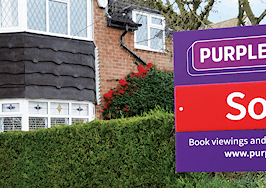Purplebricks, a low-fee U.K. brokerage that’s raised more than $60 million to expand to the U.S., misled consumers with ads that touted “fees saved” comparisons between Purplebricks and traditional real estate agents, a U.K. regulator has ruled.
The ruling, which grew out of a complaint filed by a Purplebricks competitor, highlights Purplebricks’ hard-charging marketing strategy and hints toward a potentially chilly reception by U.S. brokerages.
The Advertising Standards Authority (ASA), which regulates advertising in the U.K., ordered Purplebricks not to display the ads that were complained about and to ensure that ads making comparisons between Purplebricks and its competitors include “sufficient information” so consumers aren’t misled.
The ASA issued the order after investigating allegations from Arun Estate Agencies, a traditional U.K. brokerage, that challenged whether Purplebricks’ “fees saved” claims were misleading and could be substantiated.
“We continue to have constructive correspondence with the ASA and strive to adhere to their requirements, which previously found the 1.8 percent average commission fee including VAT (value-added tax) satisfactory,” Purplebricks said in a statement.
“Our research unearthed that establishing a figure for this is complicated by virtue of the lack of transparency on fees from traditional agents, whereas we publish our fees on our website,” the company added in a jab at the old guard.
“We have since redone the research exercise into average estate agency commissions and shared [that] with the ASA.”

Purplebricks ads examined by the ASA conveyed that three clients had saved a certain amount of money by using Purplebricks instead of a traditional “high street” agent. The advertised savings were calculated based on a comparison between an assumed traditional commission of 1.8 percent and the fees charged by Purplebricks, which ranged from roughly 800 pounds to 1,160 pounds, according to the ASA.
U.K. real estate commissions, like those in many other wealthy countries, are considerably lower than in the U.S., in part because U.K. residents generally don’t use buyer’s agents, removing the need for a listing broker to share half of a listing commission with another agent. (In the U.S., Purplebricks plans to offer typical compensation to buyer’s brokers, electing to embrace a commission system that it has no experience with.)
Purplebricks purportedly told the ASA that it came up with the 1.8 percent commission number by taking the average fee quoted by almost 1,800 former clients and then tacking on a U.K. VAT — which Purplebricks assumed was not included in the commissions quoted to respondents.
According to the ASA, Purplebricks also said statements by two websites supported its average commission finding, and that consumers would realize a reference in its survey of clients to “traditional high street estate agents” would be understood to exclude online or “hybrid” estate brokerages without offices.
But the ASA concluded the evidence provided by Purplebricks “was not adequate to support the basis of the ‘Fees saved’ comparison in the ad.”
The ads weren’t clear that the comparisons made were only between Purplebricks and “high street” agents, the agency said, implying that consumers could have thought the 1.8 percent commission number covered online brokerage fees as well.
The ASA also said the ads didn’t make it clear that Purplebricks charges extra fees to show homes to prospective buyers, whereas traditional agents do not.
And it questioned the evidence provided by Purplebricks to support its 1.8 percent commission finding, citing potentially confusing language in its survey of former clients and a lack of evidence substantiating other third-party estimates referenced by Purplebricks.
Striving to eliminate ‘commisery’
Purplebricks has gobbled up U.K. marketshare since launching in 2014, putting market incumbents on the defensive and riling many agents over the tone of its ads.
One Purplebricks video ad encourages consumers to avoid “commisery” — “the misery you feel when you spent thousands on commission but got nothing more for your money.” How? By using Purplebricks, of course.
The U.S. old guard could draw lessons from Purplebricks’ history of disruption across the pond as the upstart sets out to replicate its success in the U.S.
The brokerage recently raised more than $60 million to storm the states, starting with California in the second half of this year.
Eric Eckardt — a founder of multiple real estate startups and the former vice president of online real estate at Altisource — will head up the expansion, leading an effort to hire “some of the most experienced real estate agents.”

Purplebricks will couple this recruiting push with a business model adapted to the U.S. market and a marketing campaign “built upon the company’s successful brand lead strategies in the U.K. and Australia.”
In the U.S., Purplebricks — which will operate as a cloud-based brokerage without physical offices — will offer a blend of technology, hands-on service and low fees. Its technology platform provides features such as the ability for sellers to approve showings and view the performance of their listings.
Purplebricks will charge a list-side commission that’s less than a quarter of the going U.S. rate, but it will collect full buy-side commissions when representing buyers and make typical offers of compensation to buyer’s brokers, Eckardt previously told Inman.
Some low-fee brokerages have struggled to attract top talent because agents can often make more money by charging traditional commissions.
Eckardt said Purplebricks can overcome this challenge because agents will receive free leads and support, and they will collect a typical commission for representing buyers.
Purplebricks’ U.K. marketing strategy of casting agents as overpaid may have irked the industry across the pond. But Eckardt previously said the brokerage’s U.S. messaging should “ultimately resonate” with both consumers and agents here.












